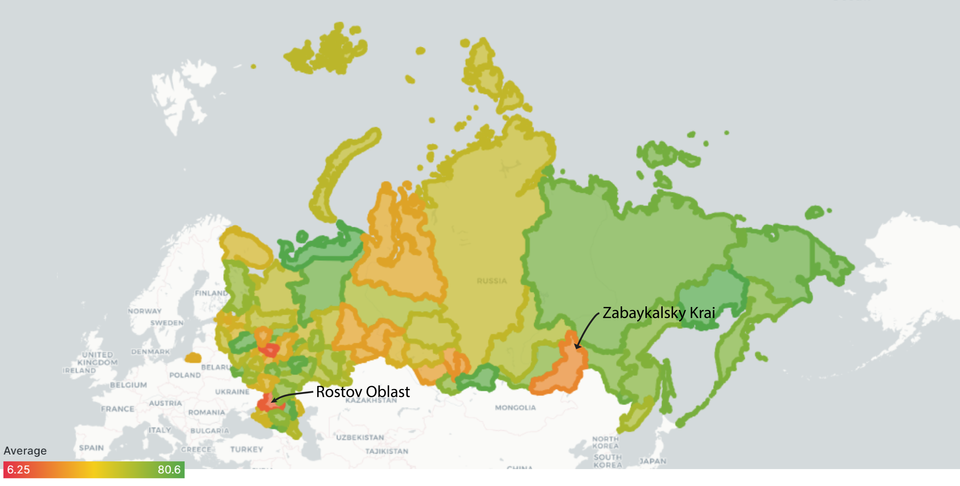Regional Variations: Russians’ Attitudes Toward the War and More

A paradox of the modern media landscape is that the world seems to be at once more comprehensible and more bewildering. Comprehensible because anyone with access to the internet can get information from almost anywhere on the globe. And bewildering, because the deluge of information makes it almost impossible to know what’s important or what’s really going on.
This is a problem equally for governments and reporters, not to mention the ordinary citizen. All of them need not just information but a way to sort it and figure out its significance.
At FilterLabs we are building tools to help. Our latest is the data platform Talisman, which uses a large language model to collect millions of articles and social media artifacts and then analyzes them.
Take, for example, regional variations in mindset and attitudes across Russia. During last week’s Washington Dialogues, in which FilterLabs took part, policymakers admitted that while they knew a great deal about Moscow and St. Petersburg, they knew relatively little about the outer regions.
With its geolocated data, Talisman can examine data from specific regions. It can, for example, look at sentiment about the war in local news stories and online discussion in each of Russia’s federal subjects:

Or articles about the economy:

Or in articles on Putin:

Taken together, these maps can start to reveal trends. For example, all three maps show relatively low sentiment in some of the same regions, such as Rostov Oblast, near the Ukrainian border, and Zabaykalsky, which shares a border with China.
Sentiment scores may tell us something about local attitudes and how they vary across Russia. But Talisman can then take users even further: behind the scores, to the actual articles and artifacts themselves.
The FilterLabs team used Talisman to take a look at some of the discourse underlying the sentiment heat maps above, and we learned a number of things.
In Zabaykalsky, many of the stories with negative sentiment scores focus on corruption. It was an issue that appeared frequently in stories about the economy and the war. There are articles about the disgraced former defense minister Shoigu, and more regional items about criminal fraud charges filed against three local officials.
In terms of articles with more positive sentiment, Talisman actually found that most stories mentioning war were about previous wars. There were several stories memorializing the heroes of the Great Patriotic War (WWII). With regards to the current war in Ukraine, there were reports of growth in the defense industries, and a reminder that veterans could apply for a special “Time of Heroes” program, which could lead to leadership jobs in the public sector. But these were outweighed by more negative discussion on corruption and other themes.
The news in Rostov was more focused on the war in Ukraine. Some war-related articles were straight news about military operations (the Ukranians had attacked the town of Novorossiysk, etc.), but especially in social discussion online, there were some lurid rumors. A Telegram user claimed that an American journalist had paid school children to draw swastikas on portraits of dead Russian soldiers, while another report said that Ukrainian president Zelensky was beside himself after Russia’s recent battlefield victories, and was considering suicide.
In Rostov reports on the economy tended to be separate from war reporting. There were stories about pension reforms, tons of fish that had to be discarded after failing safety inspections, and a corruption story about the head of an economics department who had been accepting bribes in return for good grades.
There were important similarities and differences between news environments in these two regions. In Zabaykalska, the war seems relatively distant. In Rostov, so near the front, the war is ever-present, and rumors fly. In both regions, however, corruption makes headlines. Government malfeasance, rather than the war, seems to be the most persistently negative issue across the country.
It’s challenging to make sense of the volume of data in even a single information ecosystem—let alone one as complex as that of Russia’s diverse people and regions. But by analyzing localized data, assessing sentiment across millions of texts, and going behind the sentiment scores to the local stories themselves, Talisman is helping us through an enormous amount of information, and identify trends both on the local and on the national levels.
FilterLabs.AI is a data analytics company based in Cambridge, Massachusetts. We leverage natural language processing and tailored data modeling to scour and analyze global online communications and deliver hyper-local insights. Learn more at filterlabs.ai.
